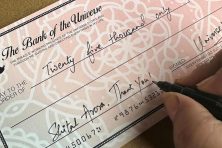15 Alternatives To The Bank That Make More Sense For Your Money

The old savings account doesn’t do much heavy lifting anymore. As the financial world shifts, people are exploring new ways to store and grow their cash. Some are unconventional, some are surprisingly practical. This article unpacks smarter alternatives that just might leave your bank account looking outdated.
High-Yield Savings Accounts (Online)

When your cash needs to stay safe but still stretch its legs, online high-yield savings accounts quietly do more. They compound interest daily or monthly, don’t demand huge balances and typically skip the fees. Best of all, your money stays liquid and easy to reach.
More From The Penny Hoarder: Here’s How to Make Money From Home
Treasury Bonds Or Bills (Via TreasuryDirect)

Security doesn’t always mean sacrificing returns. Treasury bills bring short-term predictability, while long-term bonds offer semi-annual interest with rock-solid government backing. Buying directly cuts out brokerage fees, and their stability makes them a favorite when markets wobble or banks feel too uncertain.
Make money easier. Sign up for The Penny Hoarder’s newsletter today.
Certificate Of Deposit (CD) Ladder

Locking your money away doesn’t have to mean losing access. A CD ladder spreads your deposits across staggered terms so cash keeps cycling back to you without penalties. Since each rung locks in at different rates, you lower interest rate risk while staying FDIC-insured the whole way through.
More From The Penny Hoarder: Here’s How to Get Cheap Auto Insurance Without Cutting Coverage
I Bonds

Unlike Treasury bonds or bills, I Bonds are non-tradable savings bonds purchased through TreasuryDirect. They combine a fixed rate with an inflation-adjusted rate that updates every six months. I Bonds protect your principal and offer education-related tax benefits without state or local taxes.
More From The Penny Hoarder: How to Choose a Credit Card That is Right For You
Money Market Accounts

These accounts feel like the middle ground between savings and checking, with better perks. You can write checks, use an ATM and earn more than a regular savings account. And since they’re FDIC-insured, they make a solid pick for emergency funds or short-term financial goals.
More From The Penny Hoarder: The Best Rewards Credit Cards to Maximize Your Spending in 2025
Roth IRA (For Future Goals)

Planning long-term? A Roth IRA gives your money room to grow without tax headaches later. Contributions are flexible—you can pull them out anytime, penalty-free. It’s also one of the few places where funds can sit undisturbed indefinitely or help cover a first home without a financial sting.
More From The Penny Hoarder: Our Picks for The Best High-Yield Savings Account for This Month
Brokerage Account (For ETFs Or Index Funds)

A brokerage account opens the door to stocks, bonds and index funds—all in one place. As dividends and interest roll in, they can boost your returns passively. With market data and tools at your fingertips, it’s a powerhouse option when you want control and growth.
More From The Penny Hoarder: How To Budget: Create A Household Budget in 4 Simple Steps
Real Estate Crowdfunding Platforms

Want real estate without becoming a landlord? Crowdfunding platforms let you invest across properties with less cash upfront. You’ll still get rental income potential, minus the hassle of fixing leaky faucets. Professional managers handle the logistics, so you get to sit back and (hopefully) watch the returns.
More From The Penny Hoarder: 5 Strategies to Consolidate Your Credit Card Debt
Gold Or Precious Metals

Few assets hold their worth, like gold. For centuries, it’s weathered crashes and inflation. Whether kept physically or through ETFs, it cushions against economic swings. It stabilizes almost any portfolio since it doesn’t move like stocks or bonds.
More From The Penny Hoarder: What is Debt Settlement and How Does it Work?
Credit Union Accounts

Credit unions keep it simple—lower fees, better rates, personalized service and strong community roots. They often reinvest locally, supporting members instead of shareholders. Your money stays federally insured, just like at a bank, but the personal service and financial perks are hard to beat.
More From The Penny Hoarder: How to Score the Best Cheap Tires Online and Save Big
Farmland Investment Platforms

Productive land has long been a reliable place to build wealth. Farmland investing generates passive income through lease payments and land appreciation, not direct harvest profits. It’s typically more stable than housing and has a strong record of holding value and hedging against inflation and market swings.
More From The Penny Hoarder: Free Baby Stuff for Expecting Mothers in 2025 (38 Freebies & Deals!)
HSA (Health Savings Account)

An HSA is one of the most tax-friendly places to stash cash. Contributions go in tax-free, grow tax-free and come out tax-free for qualified medical expenses. Unlike FSAs, the balance rolls over each year, and after age 65, you can even use it for retirement health care.
More From The Penny Hoarder: How to Access Your Paycheck Early: 4 Reliable Options
Peer-To-Peer Lending Platforms

Borrowers who need funds, often outside traditional banks, can connect with investors through peer-to-peer lending. You can earn higher returns by funding multiple small loans and spreading the risk. It’s a fast-moving system with quick approvals, and for investors, it opens the door to a whole new income stream.
More From The Penny Hoarder: Apps That Pay $100 a Day: 15 Apps That Pay Real Money
Cryptocurrency

Bitcoin and Ethereum are digital currencies that offer a non-traditional way to grow your money outside the banking system. Some platforms also pay interest on your holdings. Although values can swing sharply, crypto offers more control and independence as a high-risk alternative to traditional banks.
More From The Penny Hoarder: How to Invest with AI: Tools and Tips for 2025
Collectibles Or Alternative Assets

Rare coins, art and vintage finds are not just cool to own; they can gain value over time. Collectibles don’t follow the same ups and downs as stocks, which helps with diversification. Plus, if you’re passionate about what you collect, the personal enjoyment adds its own reward.
More From The Penny Hoarder:












